Hyundai Bayon vs Peugeot 308 - Differences and prices compared
Costs and Efficiency:
When it comes to price and running costs, the biggest differences usually appear. This is often where you see which car fits your budget better in the long run.
Hyundai Bayon has a significantly advantage in terms of price – it starts at 20100 £, while the Peugeot 308 costs 29200 £. That’s a price difference of around 9180 £.
Fuel consumption also shows a difference: Peugeot 308 manages with 2.30 L and is therefore convincingly more efficient than the Hyundai Bayon with 5.40 L. The difference is about 3.10 L per 100 km.
Engine and Performance:
Power, torque and acceleration say a lot about how a car feels on the road. This is where you see which model delivers more driving dynamics.
When it comes to engine power, the Peugeot 308 has a decisively edge – offering 195 HP compared to 100 HP. That’s roughly 95 HP more horsepower.
In acceleration from 0 to 100 km/h, the Peugeot 308 is significantly quicker – completing the sprint in 7.60 s, while the Hyundai Bayon takes 11.30 s. That’s about 3.70 s faster.
In terms of top speed, the Peugeot 308 performs clearly perceptible better – reaching 225 km/h, while the Hyundai Bayon tops out at 179 km/h. The difference is around 46 km/h.
There’s also a difference in torque: Peugeot 308 pulls clearly perceptible stronger with 300 Nm compared to 200 Nm. That’s about 100 Nm difference.
Space and Everyday Use:
Beyond pure performance, interior space and usability matter most in daily life. This is where you see which car is more practical and versatile.
Seats: offers more seating capacity – vs .
In curb weight, Hyundai Bayon is distinct lighter – 1170 kg compared to 1453 kg. The difference is around 283 kg.
In terms of boot space, the Peugeot 308 offers slight more room – 412 L compared to 411 L. That’s a difference of about 1 L.
In maximum load capacity, the Peugeot 308 performs minimal better – up to 1323 L, which is about 118 L more than the Hyundai Bayon.
When it comes to payload, Peugeot 308 minimal takes the win – 503 kg compared to 465 kg. That’s a difference of about 38 kg.
Who comes out on top?
Overall, the Peugeot 308 shows itself to be outperforms in nearly all aspects and secures the title of DriveDuel Champion.
It convinces with the more balanced overall package and proves to be the more versatile choice for everyday use.
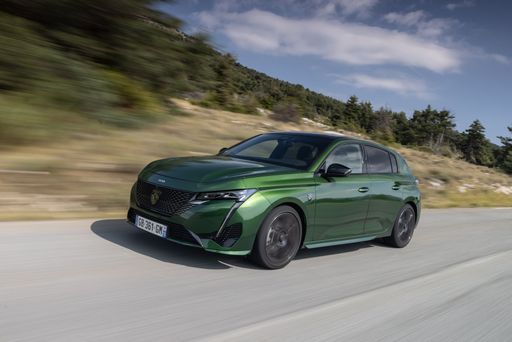 @ Peugeot / Stellantis Media
@ Peugeot / Stellantis Media
Peugeot 308
Costs and Consumption
View detailed analysis
Engine and Performance
View detailed analysis
Dimensions and Body
View detailed analysis
Hyundai Bayon
The Hyundai Bayon slips neatly between city runabout and small SUV, offering surprising practicality and a fresh, confident design that stands out in urban traffic. It's an easy buy for shoppers who want smart packaging, tidy handling and a dash of personality without fuss — a sensible little crossover that makes everyday driving a bit more enjoyable.
details @ Hyundai Motor Company
@ Hyundai Motor Company
 @ Hyundai Motor Company
@ Hyundai Motor Company
 @ Hyundai Motor Company
@ Hyundai Motor Company
 @ Hyundai Motor Company
@ Hyundai Motor Company
 @ Hyundai Motor Company
@ Hyundai Motor Company
Peugeot 308
The Peugeot 308 brings a sleek, feline profile and an unexpectedly upscale cabin, with clever packaging and materials that feel a touch more premium than you might expect. It’s composed on the road, easy to live with for daily life, and a smart choice if you want a stylish hatch that still behaves when the road gets interesting.
details @ Peugeot / Stellantis Media
@ Peugeot / Stellantis Media
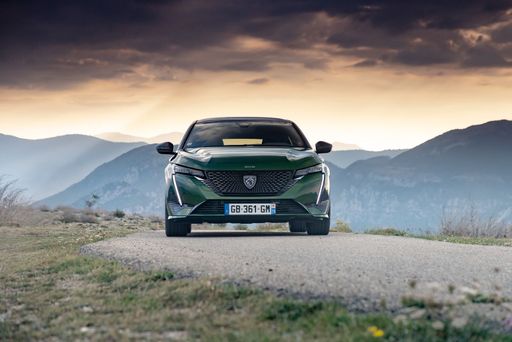 @ Peugeot / Stellantis Media
@ Peugeot / Stellantis Media
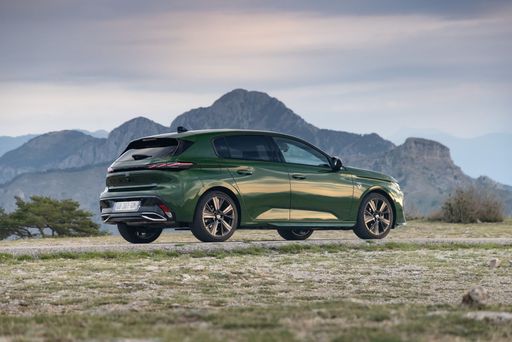 @ Peugeot / Stellantis Media
@ Peugeot / Stellantis Media
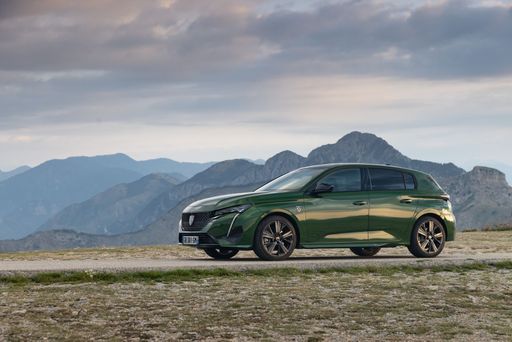 @ Peugeot / Stellantis Media
@ Peugeot / Stellantis Media
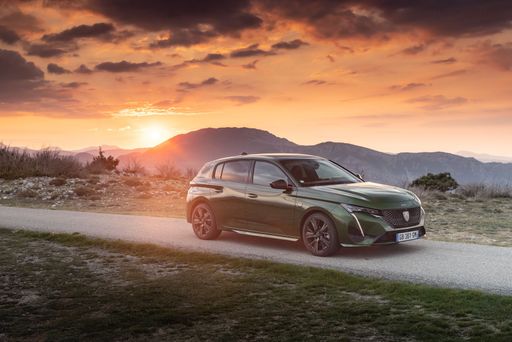 @ Peugeot / Stellantis Media
@ Peugeot / Stellantis Media
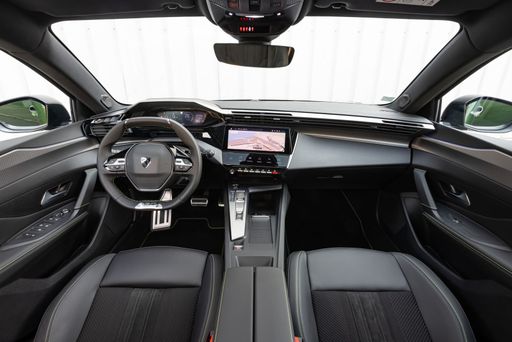 @ Peugeot / Stellantis Media
@ Peugeot / Stellantis Media
 @ Hyundai Motor Company
@ Hyundai Motor Company
|
 @ Peugeot / Stellantis Media
@ Peugeot / Stellantis Media
|
|
|
|
Costs and Consumption |
|
|---|---|
|
Price
20100 - 25800 £
|
Price
29200 - 42600 £
|
|
Consumption L/100km
5.4 - 5.5 L
|
Consumption L/100km
2.3 - 5 L
|
|
Consumption kWh/100km
-
|
Consumption kWh/100km
15.60 kWh
|
|
Electric Range
-
|
Electric Range
78 - 450 km
|
|
Battery Capacity
-
|
Battery Capacity
0.40 kWh
|
|
co2
124 g/km
|
co2
0 - 129 g/km
|
|
Fuel tank capacity
40 L
|
Fuel tank capacity
42 - 52 L
|
Dimensions and Body |
|
|---|---|
|
Body Type
SUV
|
Body Type
Hatchback
|
|
Seats
5
|
Seats
5
|
|
Doors
5
|
Doors
5
|
|
Curb weight
1170 - 1195 kg
|
Curb weight
1453 - 1749 kg
|
|
Trunk capacity
411 L
|
Trunk capacity
314 - 412 L
|
|
Length
4180 mm
|
Length
4367 mm
|
|
Width
1775 mm
|
Width
1852 mm
|
|
Height
1500 mm
|
Height
1438 mm
|
|
Max trunk capacity
1205 L
|
Max trunk capacity
1258 - 1323 L
|
|
Payload
460 - 465 kg
|
Payload
430 - 503 kg
|
Engine and Performance |
|
|---|---|
|
Engine Type
Petrol
|
Engine Type
Petrol MHEV, Diesel, Plugin Hybrid, Electric
|
|
Transmission
Manuel, Automatic
|
Transmission
Automatic
|
|
Transmission Detail
Manual Gearbox, Dual-Clutch Automatic
|
Transmission Detail
Dual-Clutch Automatic, Automatic Gearbox, Reduction Gearbox
|
|
Drive Type
Front-Wheel Drive
|
Drive Type
Front-Wheel Drive
|
|
Power HP
100 HP
|
Power HP
131 - 195 HP
|
|
Acceleration 0-100km/h
11.3 - 12.4 s
|
Acceleration 0-100km/h
7.6 - 10.6 s
|
|
Max Speed
176 - 179 km/h
|
Max Speed
170 - 225 km/h
|
|
Torque
172 - 200 Nm
|
Torque
230 - 300 Nm
|
|
Number of Cylinders
3
|
Number of Cylinders
3 - 4
|
|
Power kW
74 kW
|
Power kW
96 - 144 kW
|
|
Engine capacity
998 cm3
|
Engine capacity
1199 - 1598 cm3
|
General |
|
|---|---|
|
Model Year
2024
|
Model Year
2025
|
|
CO2 Efficiency Class
D
|
CO2 Efficiency Class
C, D, B, A
|
|
Brand
Hyundai
|
Brand
Peugeot
|
What drivetrain options does the Hyundai Bayon have?
The Hyundai Bayon is available as Front-Wheel Drive.
The prices and data displayed are estimates based on German list prices and may vary by country. This information is not legally binding.
